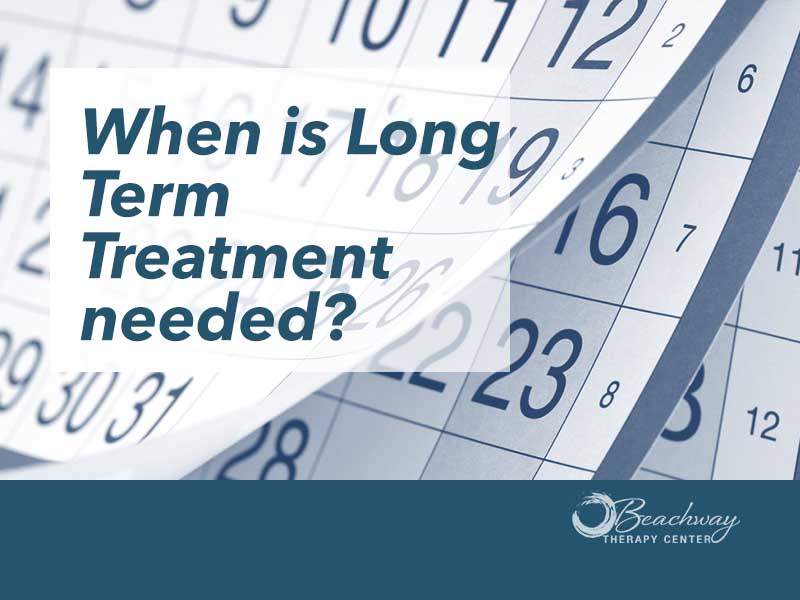
When is Long Term Treatment needed
How long is ‘long enough’?
We understand that this question perhaps raises concerns and worries for some who are considering treatment. In our experience working with substance use disorder and mental health disorders, a long-term continuum of care treatment plan produces better outcomes based on evidence-based research and our own anecdotal evidence. Long-term treatment has shown that abstinence from alcohol and drugs, as well as an individual’s ability to continue to reduce negative symptoms of mental health disorders, is more obtainable. Individuals receiving long-term treatment and therapeutic interventions develop the skills, receive the support, and become more self-sufficient in combating the mental health disorders they came to get help to treat. The National Institute on Drug Abuse (2018) reports that “because addiction is a disease, most people cannot simply stop using drugs for a few days and be cured. Patients typically require long-term…care to achieve the goal of sustained abstinence and recovery of their lives.” The Surgeon General classifies substance abuse as “a chronic disorder” and “a national epidemic” – championing the need for health care and society to recognize the severity and mortality of this disorder. Furthermore, there is well-supported evidence (see the websites of Substance Abuse and Mental Health Services Administration, SAMHSA, and The National Institute on Drug Abuse, NIDA) that shows treatment for substance use disorders through the inpatient, residential, and outpatient models as being the most cost-effective compared with no treatment. Beachway’s continuum of care approach for those arriving in treatment with substance use or co-occurring disorders is comprised of a personalized, integrated system of care that begins with our first initial contact and guides the person over time through a wide-ranging array of services (including but not limited to our medical, nursing, and clinical teams) to support an individual’s needs effectively.

Benefits of Individualized Treatment
Every individual who comes to us to get the help they deserve and oftentimes desperately need is treated from a case-to-case perspective. No one person receives the same treatment, and many evidence-based treatment modalities are clinically effective and are applicable to those who come to us. We have seen an influx in the types of illicit substances used, the length of time one has been using, and the compounded and at times extensive dual-diagnosis disorders that have created complex histories and necessary long-term treatment planning. This complexity of disorders gives rise to the needed long-term care for individuals due to the individual’s history. Shorter-term care does not provide nor allow for individuals to ‘un-fog,’ receive the variety of coping skills, develop and learn to implement emotional regulation techniques, change to cognitive and behavioral sharpness, identify and adopt healthy behaviors, and absorb the psychoeducation that is required for long-term recovery. When an individual arrives at Beachway Therapy Center, the clinical, medical, and admissions team discusses each person’s case and monitors changes and developments along their care continuum. Often it can take multiple weeks before a person stabilizes mentally and physically. Even more important, it can take time for mental, emotional, and behavioral issues to surface and show up. As we monitor, assess, and treat each person, we can identify the needs and specific interventions throughout their stay.

The Continuum of Care Model at Beachway Therapy Center
Individuals battling substance and/or alcohol abuse begin their stay in a medically assisted detoxification level of care. Here, individuals arrive oftentimes still intoxicated, many having been using/abusing illicit substances or drinking alcohol for many years. Safely detoxing and assessing these individuals can take anywhere from 3-10 days to stabilize and then medically clear the individual. Individuals who struggle with a primary mental health disorder (E.g., Major Depressive Disorder or Bipolar Disorder) or have what is termed ‘co-morbid’ disorders (primary mental health disorder and secondary substance abuse/misuse disorder) will admit to Beachway at our Residential level of care. Here, we further stabilize and begin to develop treatment plan goals while continuously assessing the patient’s needs. During this phase of treatment, individuals are closely monitored by clinical and medical staff to address symptoms. Once a patient has begun to move further within their designated and individually designed treatment, they enter the partial-hospitalization (PHP) phase of treatment which includes a set daily schedule of group and individual therapy, assignments are completed and processed, and close monitoring of the patient is adhered to. Individuals who move into the next phase of treatment have developed skills and assets necessary for their healing, the Intensive Outpatient Therapy (IOP) and Outpatient Therapy (OP). At the outpatient level of care, they have begun to re-engage with society, find levels of independence, are making decisions for themselves, finding peers and like-minded people who they can identify with (E.g., 12-step recovery meetings), and are finding accountability from perhaps living in a sober home as well as being gainfully employed.

The Overall Benefits of Long-Term Treatment
Assessing, identifying, developing treatment plan goals, implementing therapeutic interventions, changing thought processes, developing healthy behaviors, and learning to trust oneself takes more than ‘28-days’. Patients learn to socialize again, get honest with themselves and others, explore and address not only their mental health concerns but also how the negative symptoms show up – and specifically how to heal and feel healthier and whole with this. Long-term treatment provides accountability and structure – something many individuals have not had in quite some time. The patient learns how to effectively handle their emotions, negotiate relational dynamics with their peers, manage stress, and implement coping mechanisms and techniques that they have begun to understand through therapy. Having the support of not only the clinicians but the support staff proves to be vital. Our staff at Beachway provide unconditional positive regard and innately have compassion and empathy for our patients. We are here to help support persons through some of the more challenging times of their lives.


